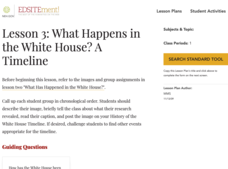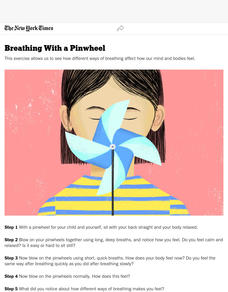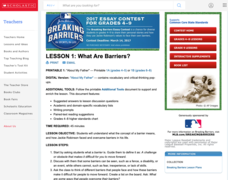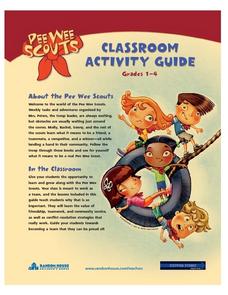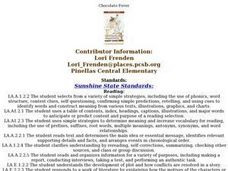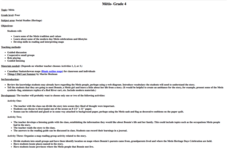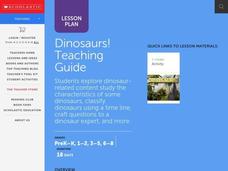University of Florida
Protecting Our Water Resources
Teach young environmentalists to protect their planet's resources with a set of interactive experiments. Kindergartners and other youngsters learn about watersheds and the water cycle, while older elementary learners focus on fertilizer...
National Endowment for the Humanities
Lesson 3: What Happens in the White House? A Timeline
Working in groups or individually, learners study images of important events that occurred at, or directly affected, the White House, and share their findings of a specific event. They then post the image of their event on a...
Youth Outreach
Connecting the Separate Powers
Scholars demonstrate what they know about the separation of powers through role play. Two individuals act out a skit as the remaining class members discuss and decide whether the interaction they observed is an appropriate example...
Media Smarts
Looking at Newspapers: Introduction
A scavenger hunt introduces class groups to the different sections of newspapers and the different types of articles found in each section.
Curated OER
Gerund as Subject
Working in groups, learners practice using gerunds as subjects by talking to one another. Then, independently, they write sentences using a subject, a verb, and a subject complement from a given list of each and in their own words. They...
The New York Times
Breathing With a Pinwheel
A pinwheel encourages deep breathing to calm one's body and recenter their thoughts. Scholars breathe into a personal pinwheel with different types of breathing patterns then answer a question about how they feel.
Including Samuel.com
Agenda/Minutes for Instructional Planning Meeting
When it comes to the education of children with special needs, it's vital for there to be regular and open communication between all parties involved. This agenda nicely outlines key topics to discuss in weekly meetings...
Scholastic
Ready to Research Owls
Researching facts about owls can be a hoot for your class. Let them wisely collaborate on this writing project. The resource is the second part of three parts. It is best to use all three lessons in order.
Scholastic
Lesson 1: What Are Barriers?
Scholars discuss the concept of a barrier with a short passage on Jackie Robinson. The writing process begins with a paragraph and several other sentences about Robinson's unique traits that made breaking a barrier...
Worksheet Web
Using Pictographs
If one ice cream cone represents three ice cream scoops, and Bob has four ice cream cones, then how many scoops does Bob have? Learners solve these kind of questions with their new understanding of pictographs.
Curated OER
Pee Wee Scouts
Students read books to discover the importance of friendship, teamwork, and community service. After reading the book, they discuss conflict resolution strategies. Students discuss healthy eating food pyramids. They write an essay...
Curated OER
Building a Bully-Free Building
Students find a comfortable position in which they can relax and close their eyes. They listen as a portion from the Bully-Free School Guided Fantasy supplement is read and visualize the way a school without name-calling would look,...
Curated OER
Chocolate Fever
Fourth graders read and interpret each chapter of the book in small groups through various exercises. Vocabulary lists are given, as well as rubrics, quizzes and activity sheets. Students create their own PowerPoint presentations to...
Curated OER
South American Gauchos
Fourth graders explore the culture and background of the South American Pampas and Gauchos. Through reading and discussion activities, 4th graders gather information about the Gauchos. To conclude the instructional activity, students...
Curated OER
Paul Revere: American Patriot
Students view a presentation at a website that introduces Paul Revere, his famous ride, and its significance in the history of the Revolutionary War. Students read text and examine maps and graphics at various websites focused on Paul...
Curated OER
"Afternoon on the Amazon" by Mary Pope Osborne
Students read and complete activities dealing with the book "Afternoon on the Amazon". They create webs of words used in the book and write about what they have read.
Curated OER
The Battle to Save Bats
Students investigate the disease that is causing the global decline of bats. In this animal health lesson, students read an article which discusses white-nose syndrome, the number one killer of bats. Students discuss ways to...
Curated OER
Aboriginals
Students are read a book about aboriginal perspectives. They answer questions and practice words with the letter "g". They participate in math drills practicing their counting as well.
Curated OER
Creating An Understanding of the Past/Through The Art of George Catlin and Native American Artifacts
Students explore Native American culture. They observe and discuss the paintings of George Catlin. Students examine the lives of the Pawnee Native American Indians during the time period of 1830-1840. Numerous cross curriculum activities...
Curated OER
The Freddy the Pig Series
Learners read the series of books called The Freddy the Pig Series by Walter R. Brooks and complete activities with them. In this The Freddy the Pig Series lesson plan, students write poetry, create drama, write in journals, do...
Curated OER
Woodwind Instruments and Pitch
Students explore musical pitch. In this cross curriculum musical instruments and "sound" physics lesson, students identify and describe common traits of woodwind instruments. Students research "pitch" and what causes pitch fluctuation by...
Curated OER
Reading Stories in Art
Students study how artists tell stories using visual images by identifying and comparing elements of narrative (setting, characters, and plot) in a painting and a Greek vase.
Curated OER
Metis
Fourth graders examine the Metis culture. In this Metis living lesson plan, 4th graders read Things I did Last Summer by Martin Shulman and discuss the life of the main character, Bonnie. Students recreate their favorite...
Curated OER
Dinosaurs
Students will develop goals for inquiry. They will also improve content area reading and research skills. The context of studying dinosaurs will help learners to distinguish from organisms that live presently and those from the past...

